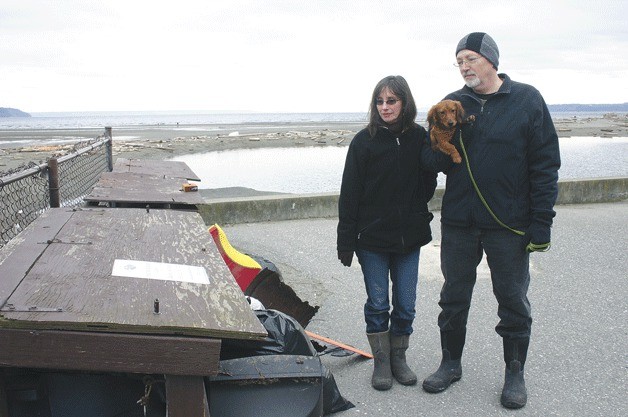Trash collection will end next week at Whidbey’s most popular county parks because of budget woes, officials said this week.
Steve Marx, Island County assistant public works director and manager of the parks, said that trash cans will be removed from the parks as of Tuesday, March 1.
“The goal is to remove all of them,” Marx said. “It’s a service we’d like to provide, but unfortunately it’s a time-consuming and labor-intensive one.”
He said county officials hope park visitors will follow the “pack-it-in, pack-it-out” rule when it comes to trash, and that the island’s vibrant volunteer community will pick up some of the slack, not to mention some of the trash.
“The community has been very good about helping,” Marx said. “We’re just asking for more help.”
On the South End, signs have been posted announcing the end of trash collection at Freeland Park, Double Bluff Beach, Dave Mackie Park in Maxwelton and Dan Porter Park in Clinton.
Trash cans already have been removed from Saratoga Woods and the boat ramp at Mutiny Bay, and are expected to be removed from Rhododendron Park near Coupeville and other island county recreation areas, Marx said.
He said that in all, 35 to 40 trash cans will be removed from the parks. He said during peak summer months, the county has been collecting 2,000 to 2,500 pounds of trash, which has been hauled to solid waste facilities in Bayview and Coupeville.
Marx said the end of trash collection is less about saving money and more about saving time.
The county’s lone parks technician, Jan Van Muyden, spends two days out of five each week collecting trash from the parks, leaving little time for other maintenance, Marx said.
“If we continue that service, we won’t be able to cut the grass,” Marx said. “We’re just balancing the priorities.”
“The bottom line is there’s no money to hire in an additional full-time or even part-time employee,” he added.
Of further concern is what happens to animal waste scooped by dog owners who walk their pets on the beaches and in the parks, and to trash and other flotsam that washes ashore and is picked up by visitors and placed near the garbage cans for pickup.
Marx said the county is working with FETCH and other volunteer organizations who might be willing to dispose of plastic pet-waste bags currently tossed in the trash cans. He also said the small containers at pet-waste stations in some of the parks may remain, so long as people don’t toss other trash into them.
Marx said he hopes others will follow the lead of several community organizations and participate in the county’s Adopt-a-Park program.
Langley resident Sharon Emerson, who regularly visits Double Bluff Beach with her Australian shepherd Belle, said she sympathizes with the county’s budget problems, but thinks there must be other places to make cuts besides trash collection in the parks.
“I recognize the county’s in trouble, but most people love the parks on South Whidbey,” she said Monday. “It’s important they remain pleasant places.”
Emerson said she would take dog waste away in her car if she has to, but added: “Psychologically, it will be difficult.”
Tracy Hasson, of Oak Harbor, who visits Freeland Park about once a week with her son, Jonathan, 6, was disappointed that trash would no longer be collected, but she hopes the public will respond.
“People here are pretty good about picking up after themselves,” she said.
Evelyn Woods and Steve Trembley of Freeland brought their puppy, Wally, to Double Bluff Beach on a chilly Monday, only to be greeted by the county’s trash-can notice.
“That’s really, really sad,” Trembley said. “It’s going to get messy around here if they don’t pick it up.”
“We pay enough in property taxes,” he added. “They should be able to cover this stuff.”



